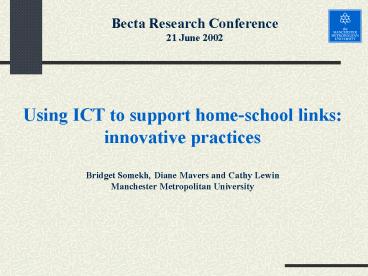Using ICT to support homeschool links: innovative practices - PowerPoint PPT Presentation
1 / 18
Title:
Using ICT to support homeschool links: innovative practices
Description:
A knowledge mapping' exercise. A survey of 100 schools. A ... 5 commercial companies: AAL, ABK, ... Equipment and internet access in the home: a ... – PowerPoint PPT presentation
Number of Views:75
Avg rating:3.0/5.0
Title: Using ICT to support homeschool links: innovative practices
1
Becta Research Conference 21 June 2002
Using ICT to support home-school links
innovative practices Bridget Somekh, Diane
Mavers and Cathy Lewin Manchester Metropolitan
University
2
Aims and background of the study
- Commissioned by DfES/Becta
- February to August 2001
- Aims
- to gather information about existing content,
organisation, management, structure and use of
electronic home-school links - to evaluate and exemplify good practice
- to inform policy and practice
3
Specific objectives
- Types of technologies and infrastructure models
of use - Particular benefits to teaching and learning,
management and administration - Software and web based content available in the
home - Implications for decision makers, schools, LEAs,
pupils and parents - Issues around implementation and management
- Further potential benefits
4
The evidence base
- A knowledge mapping exercise
- A survey of 100 schools
- A consultative seminar
- A survey of commercial providers
- Case studies of a small number of schools
5
Choosing the case study schools
- Innovative practice or vision
- A range of resources used, including networked
and portable technologies - Different phases and geographical regions
- The work of a special school
- Contrasting approaches and practices
6
Survey of schools
- Aim to provide an overview of innovative
practices in English schools - Selected schools, not a random sample
- Responses from
- 37 primary
- 65 secondary
- 6 special
- 7 independent
7
School survey findings
- It is still very early days
- There are differences between secondary and
primary schools - School websites are being used for a variety of
purposes - Schools have different views of the benefits of
email - 25 schools have tried pupil laptop schemes but
only 6 believed they had been effective - Barriers are perceived to be time, funding,
expertise, security, technical limitations, and
the digital divide
8
Commercial Survey findings
- 5 commercial companies AAL, ABK, CISCO, NTL,
Oracle - Supporting home learning is a developing market
- Products and services include Internet access,
portable technologies, online provision of
resources - Perceived issues for schools
- The digital divide
- Infrastructure
- Support structures and time
9
Findings transfer between home and school
- Continuation of work
- Floppy disc
- Access to content
- School intranet access from home via website
- Video conferencing
10
Findings curriculum content
- Pupils use ICT at home for
- - leisure (high level skills)
- - neat presentation of work
- - Internet-based research
- - revision websites
- Little use of curriculum materials on school
intranets from home - - content is still under development
- - schools need a policy and strategies for
development - - need for a dedicated web manager and/or
technician
11
Findings laptops
- Teachers laptop ownership increases confidence
and skills - Pupils laptop ownership/hire promotes very high
levels of skill and use - but ...
- - problems when not all pupils in a class have
one - - uptake affected by cost
- - anxieties about mugging
- - weight of older machines
- - some machines not robust
12
Findings benefits to teaching and learning
- Pupils are developing good skills at home
- Convenience
- Pupil enthusiasm (word processing, PowerPoint,
Internet) - Quality online resources (where they exist)
- Concerns about handwriting, spelling, replacing
booksand plagiarism) relate to changes in
society as a whole - Exceptional support for children whose schooling
is disrupted
13
Findings school management and administration
- Electronic registration
- Web-based administration (e.g. attendance)
- Computer aided report writing can reduce teacher
workloads - Assessment information made available to parents
14
Findings the digital divide
- Schools are very aware of the digital divide
- Pupils without access to ICT at home are
disadvantaged - Pupils home use of ICT and their home-developed
skills often ignored by schools - There are divides kinds of use at home as well
as access - Laptop schemes enable greatly enhanced
capabilities and confidence but some projects
have increased existing inequalities
15
Findings implementation
- Needs to be part of the schools overall vision
- A flexible, exploratory approach
- High level coordination
- Embedded in the schools work as a whole
- Need for expert knowledge and skills
- Gaps between aspirations and delivery
- Security, safety
- Cost
16
Conclusions
- Teachers ICT skills
- Laptops for teachers
- Training and support (especially in-house)
- Collaborative involvement in developing online
materials - Daily use to establish habits of use
- Expert knowledge (setting up and maintenance)
- Technical knowledge on technology and
infrastructures - Business knowledge on procurement practices
17
Conclusions
- Sustainability
- Little evidence of planning for upgrading
infrastructure - Need for long-term planning
- Equity of provision
- Funding (more advanced schools had received
extra cash) - Regional infrastructures and inequities
- Broadband versus ISDN provision
- Planning for future development in technologies
- e.g. hand-helds, digital television
18
Conclusions
- Two levels of digital divide
- Equipment and internet access in the home a
disappearing problem - Kinds of use made of ICT in the home cultural
capital - Voluntary use for school work increases the
divide - Proposed strategy to overcome the divide
- School audit of home-based ICT resources
- School-based facilities for accessing work via
email/floppy - School provision of alternative electronic
resources (e.g. CDs) - Personal Access to ICT Plans (PACTs)
- An agreed proportion of homework to be
computer-based































